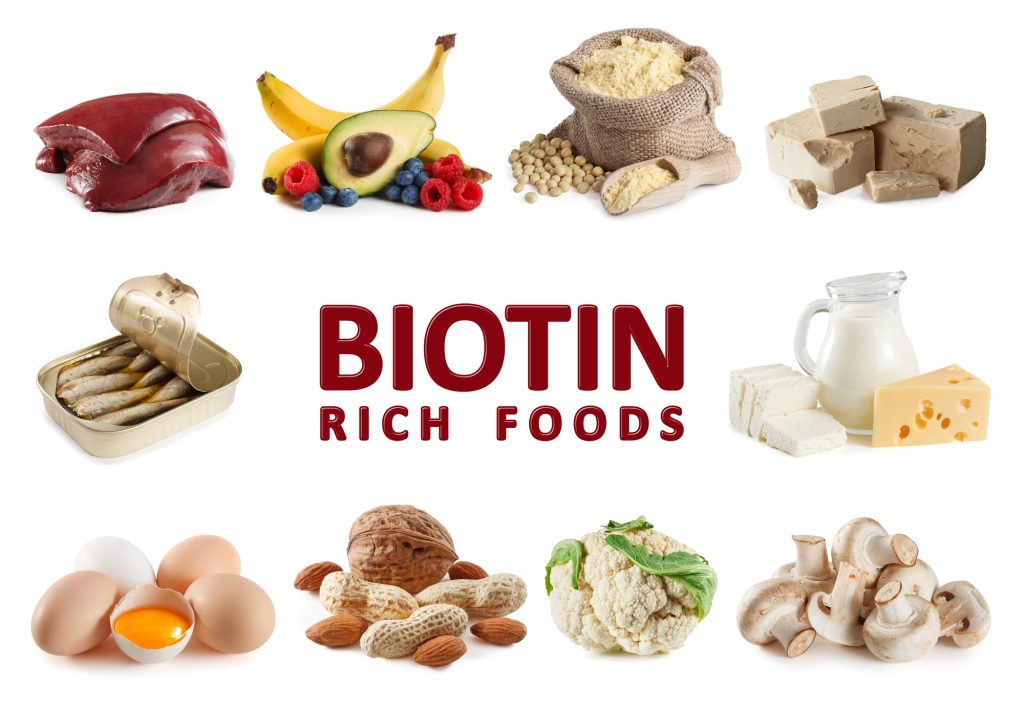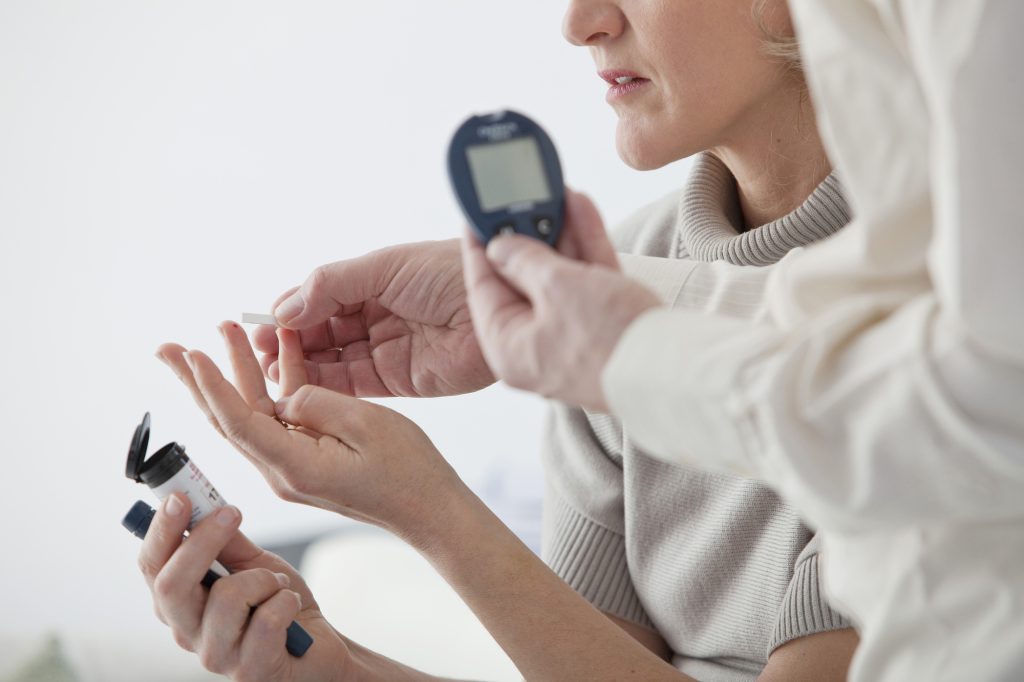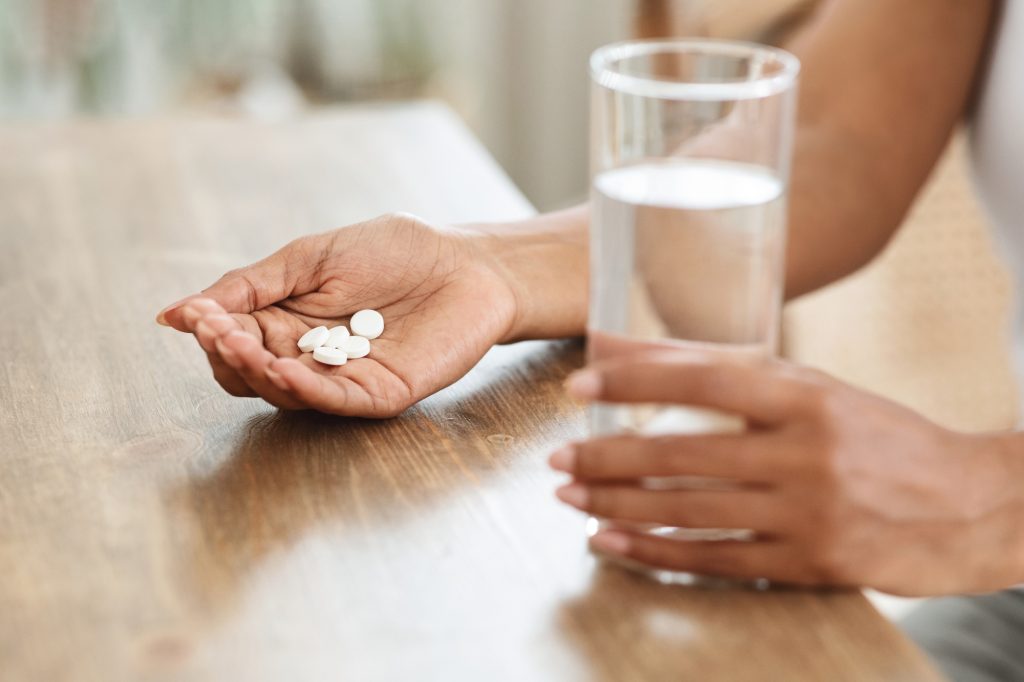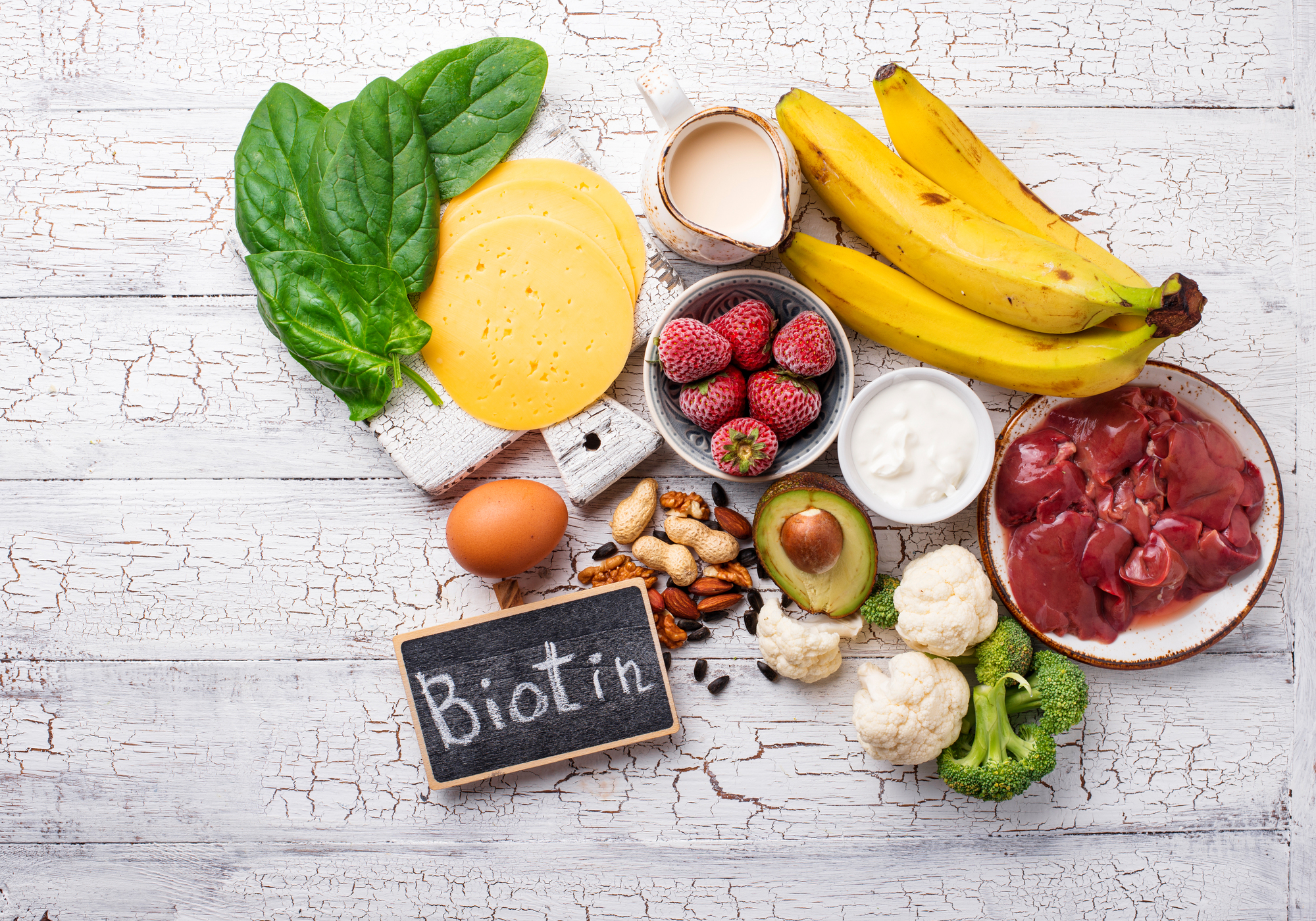You’ve likely heard of Biotin in everyday life. But do you wonder what makes Biotin so popular and beneficial? Biotin, also known as vitamin B7, is a water-soluble vitamin that plays a crucial role in many bodily functions, from supporting skin, hair, and nail health to supporting overall health. In this article, we explore the 9 major benefits of Biotin.
Key Takeaways
- Biotin, also known as Vitamin H or B7, is a water-soluble vitamin essential for many cellular metabolic reactions.
- The body does not produce enough Biotin alone, so it must be obtained through diet or supplements.
- The 9 main benefits of Biotin include supporting diabetes management, enhancing hair health, improving nail strength, promoting healthy skin, essential for pregnancy care, supporting during pregnancy and breastfeeding, aiding nerve health, potential benefits for multiple sclerosis (MS) symptoms, and helping in MS management.
- The recommended dosage for adults (19+ years) is 30 Micrograms of Biotin daily.
What is Biotin?
Biotin, also known as Vitamin H or Vitamin B7, is a water-soluble vitamin with a significant role in many cellular metabolic processes. It is also essential for the formation of fatty acids and glucose and for the metabolism of amino acids and carbohydrates.
The name “biotin” originates from ancient Greek, where “biotin” means “life” or “nourishment.”
Biotin is crucial in converting food into energy, regulating cell signals, and managing gene activity. A deficiency in Biotin can lead to serious health issues, such as developmental delays, neurological disorders, and skin abnormalities.

Common signs of biotin deficiency include:
- Hair loss
- Brittle nails
- Red rash around the eyes, nose, and mouth
- Abnormal fat distribution on the face
- Skin infections
- Conjunctivitis
- Neurological issues like depression or extreme fatigue
You might also be at risk of biotin deficiency if you take certain medications, such as anticonvulsants and antibiotics. Additionally, smoking can reduce biotin levels in the body. Currently, you can supplement Biotin through a regular diet or by using dietary supplements.
Is Biotin Important to Humans?
Biotin is an essential nutrient for the human body. However, the body can only produce a small amount of Biotin from gut bacteria. Therefore, if the body is deficient in Biotin or cannot produce enough Biotin, you may need to supplement it through food or pills.
- Biotin is found in many common foods and is primarily stored in the liver.
- Biotin is often used on its own or recommended by doctors.
9 Health Benefits of Biotin
Diabetes Support
Several studies have shown that Biotin can offer significant benefits for individuals with diabetes, particularly Type 2 diabetes. Biotin helps reduce elevated triglyceride levels, a common issue among people with diabetes.
Moreover, Biotin supports beta-cell function in the pancreas, increases insulin secretion, and improves glucose tolerance, promoting the conversion of glucose into energy, which is very useful in preventing and may manage diabetes.
Another study also found that Biotin helps protect the kidneys from oxidative damage in diabetic rats. Daily supplementation of Biotin for 12 days significantly reduced kidney damage and inflammatory responses caused by diabetes.

Promoting Hair Health
Biotin is often advertised to improve hair health. However, research shows that Biotin is primarily effective for individuals with biotin deficiency or specific conditions such as brittle nail syndrome or hair that is difficult to comb. When using Biotin, supplementation can help hair follicles grow, resulting in faster and fuller hair growth with stronger and healthier strands.
Additionally, Biotin has been noted to reverse hair loss in children treated with the anticonvulsant valproic acid and to help with hair growth in children with congenital biotin metabolism errors. For healthy individuals, the effectiveness of Biotin on hair health still requires more research. Therefore, be patient if you want to use Biotin to boost your hair health.
Enhancing Nail Strength
If you want to care for your nails, biotin supplementation can be an effective solution. Biotin can help make nails harder, stronger, and thicker. It can also improve brittle nails, triangular nails, and other deformities.
Some small studies suggest that taking 2.5 mg of Biotin daily for 6 to 15 months may improve the thickness and hardness of brittle nails. However, the results are not yet convincing due to the limited scale of the studies.
Nourishing Skin Health
Biotin may also improve skin health by supporting cellular metabolism and skin cell function. Although this benefit of biotin is less well-known, biotin can indeed help maintain healthy skin. It is suggested that biotin deficiency may lead to skin inflammatory conditions, so supplementing with Biotin might help maintain healthy skin and potentially reduce symptoms of rashes and skin infections.
Biotin also has the potential to improve psoriasis. A study found that a product containing olive polyphenols, vitamin A, riboflavin, and Biotin significantly improved the condition. In this 12-week study, the group using this product showed a marked improvement compared to the placebo group.

Essential for Prenatal Care
Biotin is also a necessary vitamin for pregnancy care, especially in diagnosing and may support enzyme disorders. Biotin supplementation successfully reduces an enzyme issue in a fetus without causing any side effects.
Some opinions suggest that about one-third of American women have mild biotin deficiency during pregnancy. However, further investigation is needed to confirm its accuracy and determine the condition’s causes.
Biotin may contribute to fetal development and metabolic processes in the body. Although there is no exact figure for the amount of Biotin, experts recommend that pregnant women consume about 30 µg per day.
Mothers can also use prenatal vitamins containing Biotin and folic acid for health care. However, to ensure safety, consult with a doctor before use.
Pregnancy and Breastfeeding Support
Biotin is especially needed during pregnancy. Although biotin deficiency does not always cause clear symptoms, research indicates that biotin supplementation can be crucial in protecting fetal health and preventing congenital disabilities.
One study showed that biotin deficiency could cause congenital disabilities, particularly in experimental animals.
Researchers have also shown that pregnant women often excrete more biotin-related substances, indicating a higher need for Biotin. Meanwhile, breastfeeding women excrete more bisnorbiotin, showing that the body is rapidly processing and using Biotin. Therefore, additional biotin supplementation may be needed beyond the current recommendations to meet the demands during pregnancy and breastfeeding.

Supporting Nerve Health
A study using high doses of Biotin found that high-dose Biotin (100 mg three times daily) could slow the progression of multiple sclerosis (MS) and help protect the brain from Alzheimer’s disease and stroke. It may reduce inflammation and support nerve health, especially when combined with other medications.
The effect of nerve health support is also evident in patients with diabetes. After just 4 to 8 weeks of high-dose biotin use, there were significant improvements in diabetic nerve damage.
Potential Benefits for Multiple Sclerosis (MS) Symptoms
The potential benefits of Biotin in addressing multiple sclerosis (MS) symptoms are still debated. One study showed that high-dose Biotin (100–300 mg/day) might help improve conditions in patients with progressive MS. About 91% of patients showed improvement after 2–8 months of treatment.
In contrast, another study indicated that high-dose Biotin (300 mg/day) was safe but did not provide long-term improvements in treating progressive MS. One-third of patients experienced worsening conditions. Some reported facial pain and other unwanted side effects.
Further research is needed to confirm the effectiveness of Biotin for MS symptoms. If you are considering Biotin, it is best to consult a doctor for clear advice and to ensure your health safety.
Assisting in MS Management
Multiple sclerosis (MS) is an autoimmune disease that damages the protective covering of nerves. Biotin may help produce this protective layer, and daily biotin doses of up to 300 mg may reduce disease progression and disability.
Research have shown that high-dose Biotin (HDB) can improve walking speed in patients with progressive MS.
Other studies also indicate that Biotin can improve disability in some patients with progressive MS, with 12.6% of patients achieving improvement compared to the placebo group. High-dose Biotin is also well-tolerated and effective over time. Thus, Biotin may support MS management by reducing symptoms and improving the quality of life for patients.
Food Sources of Biotin
Biotin, an important B vitamin, is found in various foods. Here are some rich sources of Biotin:
- Egg Yolks: Provide a significant amount of Biotin. However, it’s important to note that egg whites contain avidin, a substance that can reduce biotin absorption.
- Organ Meats (Liver, Kidneys): Especially beef and chicken liver are rich sources of Biotin.
- Certain Vegetables, Such as spinach and sweet potatoes, also contain Biotin.
- Grains: Some whole grains provide Biotin, especially nuts and breakfast cereals.
- Milk and Dairy Products: Contain small amounts of Biotin.
- Nuts (almonds, peanuts, hazelnuts, walnuts)
- Nut Butters
- Soybeans and Other Beans
- Cauliflower
- Bananas
- Mushrooms
- Cooked Hamburger Buns
- Sweet Potatoes
Biotin is also present in many other foods, but the above sources generally contain higher amounts of Biotin.

Is Biotin Supplements Safe?
Biotin supplements are manufactured and tested rigorously for quality and safety. Therefore, most biotin supplements are well-tolerated without causing significant side effects. However, to ensure safety, you may want to consult with a doctor for the most accurate advice.
Additionally, biotin supplementation may affect certain lab test results, so you should inform your doctor if you are taking Biotin.
How to Take Biotin Supplements
Biotin supplements are available in capsules, chewable tablets, or liquid soft gels. You can take Biotin with a meal to reduce the risk of stomach irritation. Swallow with water, and do not chew to make it easier to digest and absorb.
Recommended daily doses of Biotin are:
- Infants up to 6 months: 5 mcg/day
- Children 1-3 years: 8 mcg/day
- Adults (19+ years): 30 mcg/day
- Pregnant Women: 30 mcg/day
- Breastfeeding Women: 35 mcg/day
However, there may be cases where a higher or lower dose is needed. Consult your doctor to determine the most suitable dosage. Biotin generally does not cause dangerous side effects, even at high doses. Research has used doses up to 300 mg/day for treatment purposes.
Although there is no established maximum safe dose for Biotin, you should not exceed the recommended dosage on the product, as doing so can lead to side effects and negative health impacts. Always be cautious to protect your health.
Is It Good to Take Biotin Every Day?
You can take biotin supplements daily. Studies have used high doses of Biotin (300 mg/day) for up to 8 months to manage conditions with good results. Although the required supplementation dose is much lower, daily use remains safe for most people.
However, you should consult a doctor before using it for maximum safety. Some opinions suggest that daily intake may not be necessary if you have a balanced diet that provides sufficient Biotin for your body. If you need biotin supplementation for specific reasons, consult with your doctor.

Drug Interactions and Side Effects of Biotin
Biotin may interact with certain medications, such as:
- Antiepileptic Drugs: Medications like carbamazepine, phenytoin, primidone, and phenobarbital may reduce biotin levels in the body as they can increase the breakdown of Biotin or interfere with its absorption.
- Antibiotics: Some antibiotics may reduce biotin levels by killing gut bacteria involved in biotin production.
Biotin is considered safe at low doses. However, it may cause side effects in some cases, especially at high doses or in sensitive individuals.
Common side effects of biotin use include:
- Altered Test Results: High doses of Biotin can skew the results of medical tests, especially hormone tests and tests related to vitamin D and troponin, thyroid hormones, reproductive hormones, cardiovascular tests, and immunosuppressive drugs. This interference can lead to incorrect diagnoses such as hyperthyroidism and Graves’ disease.
- Allergic Reactions: Although rare, some individuals may experience allergic reactions like rash or itching when taking Biotin.
- Digestive Upset: High doses can cause digestive issues such as nausea, diarrhea, abdominal pain, or constipation.
Conclusion
Biotin is a crucial vitamin for normal body function, can support fetal health, and helps some people with diabetes. The benefits of Biotin are numerous. Since our bodies cannot produce enough Biotin, you must obtain it through food and supplements if necessary. We hope this article has provided you with useful information about Biotin.



